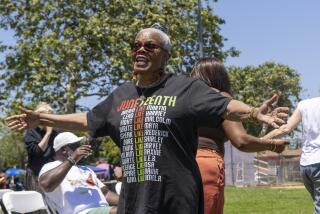Bicentennial of the Constitution Means More Than Flag-Waving
- Share via
Those who see politics in all things found it hard to believe that Warren E. Burger would step down as chief justice of the United States because he preferred to chair the constitutional bicentennial commission.
His departure and all the resulting moves are of course politics at the highest level. But that does not invalidate the chief’s stated reason. For years the idea of celebrating next year’s 200th birthday of the Constitution, which is his own 80th birthday, has been what one writer called Burger’s “ruling passion.”
There was one unsettling note in the chief justice’s comments about getting on with the constitutional birthday job. He said with concern that, so far, his commission had only “a piddling appropriation” of $12 million, while John Warner’s 1976 bicentennial commission had more than $200 million. Those who would like to see a proper celebration can hope that the current exercise remains short of funds, by 1976 standards.
We spent hundreds of millions on the 200th birthday of the Declaration of Independence, a big chunk of that on fireworks. It felt good then, 10 years ago, because we were just coming out of Watergate and Vietnam and it was a rare thing to see so many Americans waving the flag again.
We’re also spending hundreds of millions on this summer’s centennial of the Statue of Liberty, and, frankly, we’re overdoing it. If 10 years ago we needed a healthy red-white-and-blue binge, for the past six years we have been surfeited by such spectacles while glossing over the substantive history behind those anniversaries.
Flag-waving is fun, but the constitutional birthday marks an event much more complex than the Declaration or the dedication of the statue. Most Americans are basically ignorant of the document that allows us to live as fearlessly as we do. Every year or so some newspaper does man-in-the-street interviews in which passers-by say that they would call a cop if anybody spoke up in public for selected sections of the Bill of Rights.
The next five years are, in Burger’s words, “an opportunity to give ourselves a history and civics lesson that hasn’t been very well put across in the public education system, something that would offset the fact that we take for granted the system we’ve got.”
Exactly. So far, most proposed programs make sense. Others are marginal, such as running horse-drawn wagon trains through every state and more than 1,000 towns, and the San Diego 10-kilometer run, whose theme is “Exercise your constitutional rights,” and painting fireplugs to portray the Founding Fathers. Favored plans are for school courses, television series, dramas, serious efforts to see that the occasion is implanted not just on our eyeballs but also in our minds.
Most useful of all will be for every American who aspires to be elected President of the United States in 1988 to lay out and defend in detail his own thoughts on the Constitution, especially its first 10 amendments, whether in formal campaign debates or another forum. Any candidate who disdains to do so should not be considered by the voters.
Hold the fireworks. Save money. Praise the Constitution and give Warren Burger a happy birthday.
More to Read
Get the L.A. Times Politics newsletter
Deeply reported insights into legislation, politics and policy from Sacramento, Washington and beyond. In your inbox twice per week.
You may occasionally receive promotional content from the Los Angeles Times.










